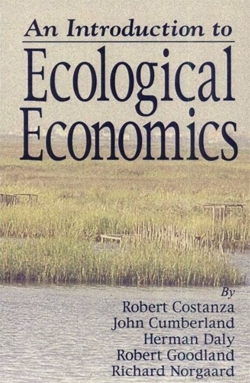An Introduction to Ecological Economics (e-book)
From The Encyclopedia of Earth
(Redirected from An Introduction to Ecological Economics)
October 2, 2007, 6:44 pm
| Topics: |
Published: 1997, St. Lucie Press and International Society for Ecological Economics
Authors: Robert Costanza, John H. Cumberland, Herman Daly, Robert Goodland, Richard B. Norgaard
Hardcover: ISBN: 1884015727
Authors: Robert Costanza, John H. Cumberland, Herman Daly, Robert Goodland, Richard B. Norgaard
Hardcover: ISBN: 1884015727
EDITOR'S NOTE: First published by St. Lucie Press in 1997, An Introduction to Ecological Economics was among the first comprehensive introductions to the field of ecological economics. A second edition is now in preparation, and the authors and publisher invite you to contribute to the revised edition. You can do so by editing and expanding the current chapters, adding a new chapter, or by writing new entries/informational boxes. Click here for more information on how to contribute.
- Preface (An Introduction to Ecological Economics (e-book))
- Acknowledgments (An Introduction to Ecological Economics: Acknowledgments)
- Humanity's Current Dilemma
- The Global Ecosystem and the Economic Subsystem
- From Localized Limits to Global Limits
- Population and Poverty
- Beyond Brundtland
- Toward Sustainability
- The Fragmentation of Economics and the Natural Sciences
- The Historical Development of Economics and Ecology
- The Early Codevelopment of Economics and Natural Science
- Economics and Ecology Specialize and Separate
- The Reintegration of Ecology and Economics
- Problems and Principles of Ecological Economics
- Sustainable Scale, Fair Distribution, and Efficient Allocation
- Ecosystems, Biodiversity, and Ecological Services
- Substitutability vs. Complementarity of Natural, Human, and Manufactured Capital
- Population and Carrying Capacity
- Measuring Welfare and Well-Being
- Valuation, Choice, and Uncertainty
- Trade and Community
- Policies, Institutions, and Instruments
- The Need to Develop a Shared Vision of a Sustainable Society
- History of Environmental Institutions and Instruments
- Successes, Failures, and Remedies
- Policy Instruments
- Informational Boxes
- Ecosystems, poverty, and the consumption elephant
- Inequity and growth
- New consumers: influence of affluence on the environment
- Rate of interest
- Preserving natural capital and biodiversity
- Hourglass analogy
- Maximum power principle
- Species extinction without market failure
- Collectively seeing complex systems
- Limits of “consumer sovereignty”
- Perverse subsidies
- Value of the world’s ecosystem services: the influence of a single paper
- Environmental taxation in Europe and the United States
- Lisbon principles of sustainable governance
- Scientific uncertainty and public policy
- Need for a shared vision of a sustainable and desirable future
- World Bank’s retreat from direct poverty reduction and back to trickle-down infrastructure growth
